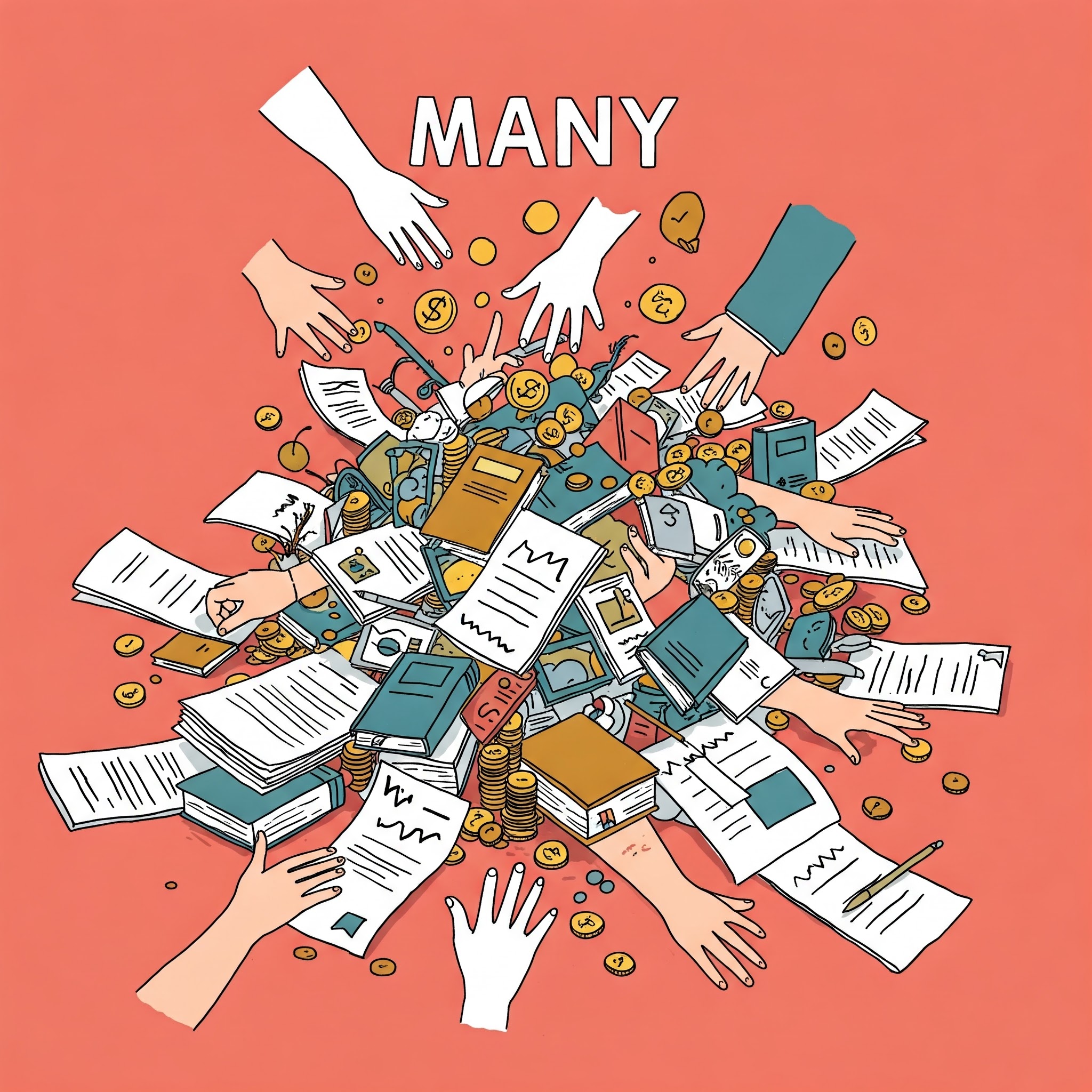Many
Definition
Many is a determiner, pronoun, and adjective. It is used to refer to a large number of people or things. As a determiner and pronoun, it indicates a quantity, while as an adjective, it describes something abundant or numerous.
Parts of Speech
- Determiner
- Pronoun
- Adjective
Pronunciation
American English
- IPA Pronunciation: /ˈmɛni/
- Respelling: MEN-ee
British English
- IPA Pronunciation: /ˈmɛni/
- Respelling: MEN-ee
Etymology
The word "many" originates from Old English "manig," meaning "numerous" or "abundant." It is derived from Proto-Germanic "*managaz," which shares roots with the Old High German "manag" and Old Norse "margr," both meaning "many."
Derivatives
- Manifold (adjective/noun)
- Numerous (adjective)
- Multitude (noun)
- Multiplicity (noun)
- Magnify (verb, related)
Synonyms
- Numerous
- Several
- Countless
Antonyms
- Few
- Scarce
- None
Usage
The word "many" is versatile and appears frequently in both formal and informal contexts. For example, "There are many reasons to visit the museum" indicates a large quantity. As a pronoun, it can stand alone, e.g., "Many came to the event." As an adjective, it describes abundance, e.g., "She has many friends."
Related Terms
- Quantity: The amount or number of something.
- Numeral: A word or symbol representing a number.
- Plurality: The state of being numerous.
Detailed Definitions
Determiner
- A large number of people or things: Refers to an abundant quantity.
- Example: "There are many books on the shelf."
Pronoun
- A large number of people or things: Used to represent a quantity without specifying what it refers to.
- Example: "Many have tried, but few succeeded."
Adjective
- Consisting of or amounting to a large number: Describes something abundant or numerous.
- Example: "Her kindness has brought her many admirers."
many



🇨🇳 Mandarin
- 许多 (Xǔduō)
- IPA: /ɕy˨˩.tuɔ˥˥/
- Respell: Shü-duo
- 很多 (Hěnduō)
- IPA: /xən˨˩˦.tuɔ˥˥/
- Respell: Hen-duo
🇮🇳 Hindi
- बहुत (Bahut)
- IPA: /bəɦʊt̪/
- Respell: Ba-hut
- कई (Kaī)
- IPA: /kaɪ/
- Respell: Kai
🇪🇸 Spanish
- Muchos
- IPA: /ˈmut͡ʃos/
- Respell: Mu-chos
- Varios
- IPA: /ˈbarjos/
- Respell: Va-ri-os
🇫🇷 French
- Beaucoup
- IPA: /boku/
- Respell: Bo-ku
- Plusieurs
- IPA: /plyzjœʁ/
- Respell: Ply-zyer
🇸🇦 Arabic (Modern Standard)
- كثير (Kathīr)
- IPA: /ka.θiːr/
- Respell: Ka-theer
- عديد (ʻAdīd)
- IPA: /ʕadiːd/
- Respell: 'Adid
🇧🇩 Bengali
- অনেক (Anek)
- IPA: /ɔnek/
- Respell: O-nek
- বহু (Bahu)
- IPA: /bɔho/
- Respell: Bo-hu
🇷🇺 Russian
- Много (Mnogo)
- IPA: /ˈmnogə/
- Respell: Mno-ga
- Несколько (Neskol'ko)
- IPA: /nʲɪˈskolʲkə/
- Respell: Ni-skol-ka
🇵🇹 Portuguese
- Muitos
- IPA: /ˈmujtuʃ/
- Respell: Mui-tush
- Vários
- IPA: /ˈvaɾjuʃ/
- Respell: Va-ri-u-sh
🇮🇩 Indonesian
- Banyak
- IPA: /ˈbanjak/
- Respell: Ban-jak
- Sejumlah
- IPA: /sə'dʒumlah/
- Respell: Se-ju-m-lah
🇩🇪 German
- Viele
- IPA: /ˈfiːlə/
- Respell: Fee-le
- Mehrere
- IPA: /ˈmeːʁəʁə/
- Respell: Mehr-e-re
🇯🇵 Japanese
- 多くの (Ōku no)
- IPA: /oːku no/
- Respell: O-ku no
- 数多く (Kazuōku)
- IPA: /ka.zuoː.ku/
- Respell: Ka-zu-o-ku
🇻🇳 Vietnamese
- Nhiều
- IPA: /ɲiəw˧/
- Respell: Nyeu
- Rất nhiều
- IPA: /ʐət˧ ɲiəw˧/
- Respell: Zat nyeu
🇰🇷 Korean
- 많은 (Manheun)
- IPA: /man̥ɯn/
- Respell: Man-heun
- 수많은 (Sumanheun)
- IPA: /sʰuman̥ɯn/
- Respell: Su-man-heun
🇹🇷 Turkish
- Çok
- IPA: /tʃok/
- Respell: Chok
- Birçok
- IPA: /biɾˈd͡ʒok/
- Respell: Bir-chock
🇵🇰 Urdu
- بہت (Bahut)
- IPA: /bə.ɦʊt̪/
- Respell: Ba-hut
- کئی (Kaī)
- IPA: /kaɪ/
- Respell: Kai





